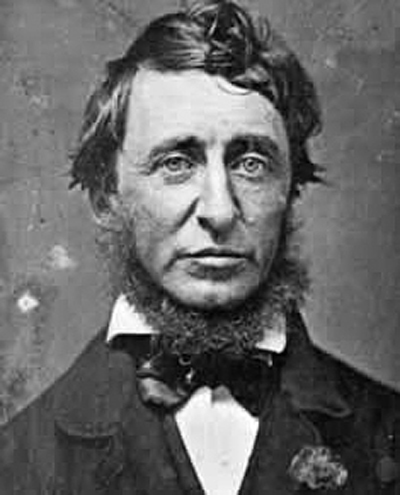I guess it was inevitable that the North Pond Hermit, who police say lived by himself in the woods of Rome for 27 years, would be compared to Thoreau.
There’s something very curious about separating yourself from human beings and choosing to live in a tent every bitter cold winter instead of a heated apartment with running water. It seems to have a kind of idyllic, hardy-outdoorsman quality to it. As the owner of a plundered camp told a reporter, it’s kind of like Henry David Thoreau living by himself in nature.
But really, the only similarity between Christopher Knight and Thoreau is that they both lived alone in the woods for longer than a normal camping trip. After that, all comparison disintegrates.
Knight was allegedly a hermit: someone who withdraws from society and lives alone.
Thoreau was not.
You might recall from an English class that in March 1845, Thoreau — by trades a surveyor, teacher, pencil maker and boat builder — “borrowed an ax and went down to the woods” to build a cabin on Walden Pond, a couple of miles outside Concord, Mass. The land and the ax belonged to his friend, Ralph Waldo Emerson. That July he gathered some start-up housekeeping items and moved into the cabin, where he lived by himself until Sept. 6, 1847.
While he was there, he made notes for his book “Walden” (where you can see, incidentally, detailed lists of his start-up items and their costs).
He baked his bread. He fished. He raised beans. He gathered edible plants. Once he killed and ate a woodchuck (just once). He had a good many visitors, many of them just curious to find out what he was doing out there by himself. He often talked with neighbors during his daily excursions in the surrounding woods and fields. Occasionally he walked into town, and it’s believed he sometimes brought his laundry to his mother.
In February 1846 he lectured at the Concord Lyceum, and that September he went on a well-planned expedition to Mount Katahdin.
He occupied his days observing nature. He kept extensive journals of what he saw and experienced. In a time when collecting specimens of plant and animal life was a common hobby, he came to be regarded as Concord’s premier amateur naturalist. He contributed some of his findings to the influential natural scientist Louis Agassiz.
His expressed purpose for living by himself was not to get away from people, but to “live deliberately, to front only the essential facts of life, and see if I could not learn what it had to teach, and not, when I came to die, discover that I had not lived.” It’s clear from his writings that he was not free of a harsh skepticism about the way people behave and carry on listless, unimaginative lives.
But living by himself was not so much an effort to escape from people as it was to discover the actual, basic necessities of life apart from the cluttered trappings of civilization. He wanted to get his mind clear and report what he found.
Thoreau, it is probably not too far-fetched to say, invented the way we think about nature. In “Walden” and essays such as “Ktaadn,” he (in concert with Emerson and others) gave the first uniquely American shape to the idea that the natural world has deep importance for the inner — as well as physical — lives of human beings.
The notion that Christopher Knight might somehow be a noble wilderness figure springs directly from Thoreau’s illuminations about our relationship to nature and “wildness,” as he called it.
Thoreau also gave shape to powerful ideas about individual and political freedom. On one of his visits to Concord village in 1846 he got arrested and thrown in jail because he had refused to pay his poll tax. This experience turned into the essay “Resistance to Civil Government” (or “Civil Disobedience”), which profoundly influenced India’s struggle for freedom from Great Britain and the U.S. civil rights movement. His writings on individual freedom and responsibility contain quintessential elements of what we now call libertarianism and, in Emerson’s phrase, self-reliance.
While Thoreau very clearly explains his reasons for living by himself, no one seems to know for sure what motivated the North Pond Hermit. He withdrew from society. According to police, he apparently survived by stealing hundreds of thousands of dollars’ worth of food, clothes, batteries and gewgaws such as Gameboys from neighbors’ dwellings because it was too much work to go fishing.
As far as anyone can tell at this point, he gave nothing back — unless you count this widespread curiosity we all feel about what it must have been like to live alone in a tent in the Maine woods for 27 years.
In “Walden,” Thoreau wrote: “Most (people) think that they are above being supported by the town, but it often happens that they are not above supporting themselves by dishonest means, which should be disreputable.”
Beyond the fact that they both lived alone in the woods, there is literally no comparison between Thoreau and Christopher Knight.
Dana Wilde lives in Troy. His writings on the Maine woods are collected in “The Other End of the Driveway,” available from Booklocker.com. Backyard Naturalist appears the second and fourth Thursdays of the month. You can contact him at naturalist@dwildepress.net.
Send questions/comments to the editors.




